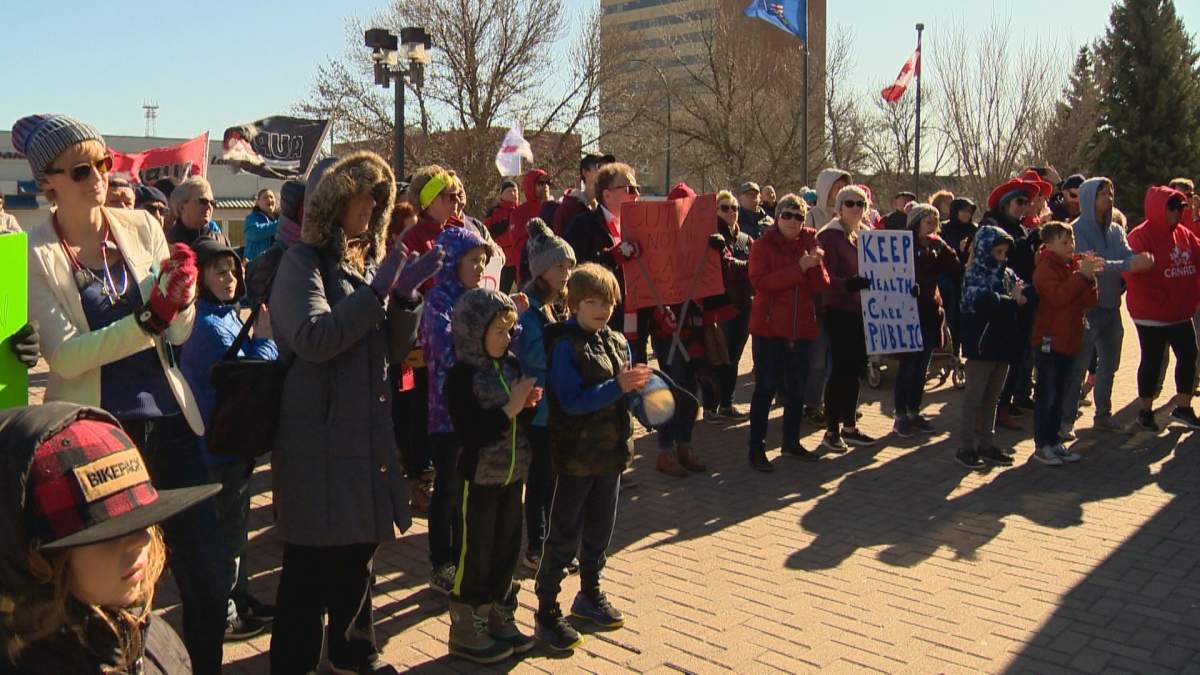Close to 200 protesters gathered in front of the Lethbridge Courthouse on Saturday afternoon to protest budget cuts to the public sector announced in this year’s provincial budget on Thursday.

Since public sector jobs will be taking the hardest hit, the crowd largely consisted of teachers, doctors, nurses, civil servants and other public sector employees, along with AUPE members.
According to organizers, protests such as this one took place across the province in Calgary, Medicine Hat, Red Deer, Lethbridge, Fort McMurray and Banff on Saturday.
The protest started at the courthouse, then protesters marched to the Galt Gardens and back to the courthouse.
Several cars passing by honked to show support, and protesters could be heard chanting “shame on Kenney.”
The rallies focused on key areas of the public sector including cuts to education and health-care funding.
Protesters wore red to support those who are passionate about public education as well as to show unity amongst public sector workers.
The Lethbridge Raging Grannies were at the event and sang a song to condemn cuts made in the United Conservative Party’s budget.
“As grannies, these are social justice issues we all care about, and we are going to come out and sing, and rant, and rage as required until we get the attention of the current government,” said Barb Phillips, one of the “raging grannies.”
“It goes without saying that cuts to doctors, the health-care system, affects seniors, more than the rest of the population, but there’s not one of us in Alberta that does not at some time have to avail ourselves of doctors, or the health-care system.”

Get daily National news
She says health care is a hot-button issue for many seniors since they do generally require more heath-care services than the rest of the general population.
“We are also concerned about the children in Alberta, about the special needs children who are seeing cuts to their education and health care,” Phillips adds.
She notes that impending layoffs and job losses through attrition may also inevitably impact the Alberta economy.
“If our current government goes ahead with these cuts, which naturally means layoffs, this is going to stall our economy, in fact, it already has with increasing unemployment.”
She goes on to say that the breadwinners of families and individuals who rely on public sector jobs are going to be negatively impacted by the cuts.
Thursday’s budget maintains operational funding at current levels for some core services: $8.2 billion for kindergarten to Grade 12 education and $20.6 billion for health.
On Thursday, the government said it plans to hold the line on salary hikes for public sector workers while continuing to reduce jobs, mainly through attrition. The government is also pursuing benefit and salary cuts from thousands of public-sector workers.
The province is projecting it will spend $26.7 billion on public-sector compensation while full-time equivalent jobs are expected to drop by 1,436 this year, primarily through attrition.
Protesters say they believe the government is cutting funding from the wrong places, that education and health care are highly important services and should not be taken away from.
Bev Muendal-Atherston, the chair of the Lethbridge chapter of Friends of Medicare, says all of the cuts to public sector jobs and services will “cause stress” and prevent Albertans from being a healthier population.
“It’s painful to watch a government give out $4.7 billion … to corporations that are already wealthy and take funding away from social services, which will help all of us.
A spokesperson with the premier’s office said in a statement that the reductions in spending are “necessary.”
“Alberta cannot continue spending billions more than it takes in every year. Our plan reduces spending by less than three cents on the dollar over a period of four years, while maintaining record spending on health, education, social and children’s services,” the statement read. “We recognize that those public sector unions seeking taxpayer funded pay raises may prefer tax hikes, but our province must live within its means.”
The 2020 budget projects a deficit of $6.8 billion on revenues of $50 billion. Debt is expected to rise to almost $77 billion by spring 2021 and to nearly $88 billion by 2023.
–With files from Global News’ Adam MacVicar, Phil Heidenreich and Michael King









Comments